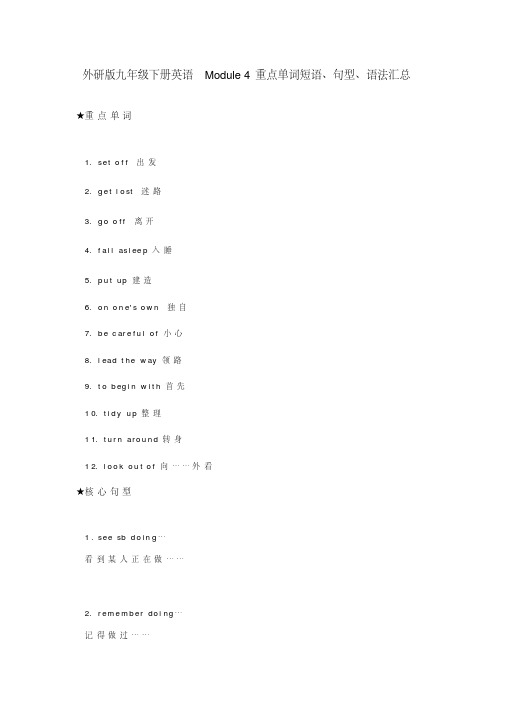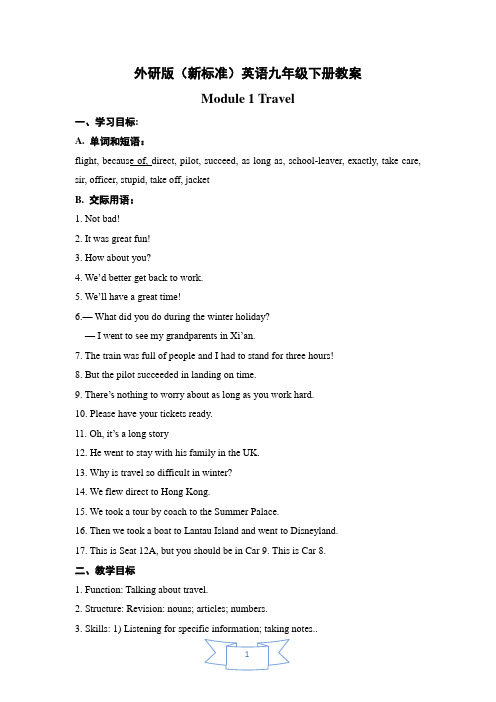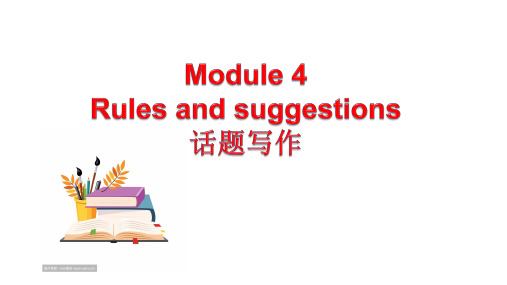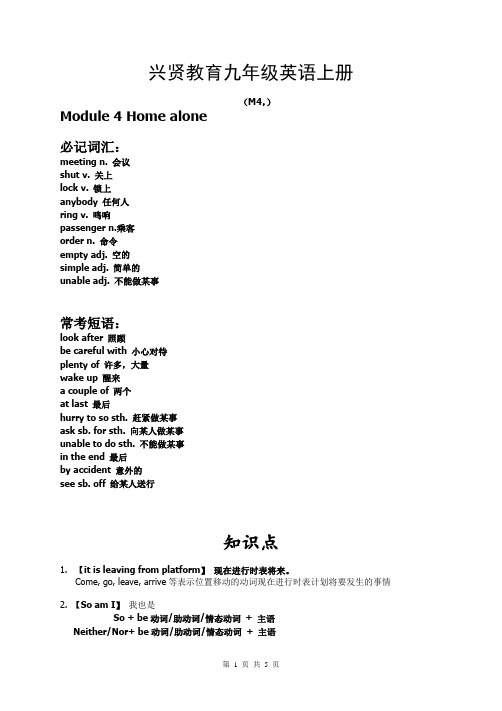最新外研版九年级下Module4主要知识点与语法Module(精)
2023年外研版英语中考一轮复习外研版九年级下册Module3-module4 知识点复习专练

外研版九年级下册Module3-module4 知识点复习专练一.根据汉语提示完成句子1.她骑自行车和老妇人一样慢.(as…as…) _______________________2.海伦不允许我开她的车.(allow sb.to do sth.) ____________________3.这件外套适合我.(be fit for) __________________________________4.她过去常常早上读书,但现在她习惯于跑步.(used to ) __________5.健康比财富更重要. (wealth) _________________________________6.我没有买那套房子,因为我不能买得起它.(afford to do ) _________7.老师要求学生们注意保持清洁.(pay attention to) _______________8.汤姆已经结婚十年了.(marry)___________ ____________________9.国庆节那天,长城上挤满了游客.(be crowded with) ____________10.你应该独立完成家庭作业.(on one’s own) _____________________11.记得说话大点声,她现在有点耳背了.(speak up) ______________12.我们学校的学生数是2300.(the number of) _二.用所给词的适当形式填空1.Whenever you go _______(walk) in the hills,you should always wear proper clothes.2.When the number of cars is ________(double),the pollution is also doubled.3.Generally__________(speak),I think life is better today.4.In the past,there were no___________(electricity) lights,only candles.5.No one can run ________(fast) in the forest than a bear .6.It should be a fairly smooth walk_______(begin) with.7.The three of us were tired after_______(walk) for about eight hours.8.Suddenly,I saw a baby bear _______(play) with some sticks and stones .9.While the others ___________(rest) , I went for a walk in the forest.10.Let’s ________(start) walking , and we’ll stop at noon for our picnic.11.We don’t have a gun to keep us_________(safety).12.If I _______(reach) out,I can just touch him.13.Some of the shows are too_______(noise) for me..14.She goes to work even after getting _______(marry).15.She has lived in Beijing all her _______(life).16.________(look) after us was more than a full-time job.17.My daughter is really lucky and she has a good ________(educate).18.You must be careful of _________(fall) stones.19.You have to keep together so you don’t get_______(lose).20.Before we set off, there are a few rules and _________(suggest) for you.21.Don’t _______(drink) all your water in one go.22.Can we have something to eat now ? I’m __________(starve).三.单项填空从下列每小题所给的A、B、C、D四个选项中,选出可以填入空白处的最佳选项。
外研版九年级下册英语Module4重点单词短语、句型、语法汇总

外研版九年级下册英语Module 4重点单词短语、句型、语法汇总★重点单词1.set o f f出发2.g et l o st迷路3.g o o f f离开4.f al l as l ee p入睡5.p u t up建造6.o n o n e's o w n独自7.b e c ar e f u l o f小心8.l ead t he w ay领路9.t o b eg i n w i t h首先10.t i d y u p整理11.t u r n ar o u n d转身12.l o o k o u t o f向……外看★核心句型1.see sb d o i n g…看到某人正在做……2.r em e m b er do i ng…记得做过……★语法点击情态动词一、常用情态动词的基本用法◆ c an可表示能力,意为“能;会”。
c an还可表示请求、允许,意为“可以”。
co u l d表示请求时,语气比c a n更加委婉和客气。
◆ m ay表示请求、允许,意为“可以”。
m i g h t表示请求时,语气比m ay更加委婉和客气。
◆ m u s t表示义务、命令或必要,意为“必须”,强调主观看法。
m u st n't表示“不允许;禁止”。
h a v e t o意为“不得不”,强调客观需要。
◆ s h ou l d意为“应该”,既可以表示义务或责任,还可以表示劝告或建议。
其否定式为sh ou l dn't,意为“不应该”。
二、情态动词表示推测◆c an表示推测时常用于否定句中,此时,ca n't意为“不可能”。
◆m u s t表示推测时常用于肯定句中,表示很有把握的推测,意为“一定”。
三、情态动词一般疑问句的回答◆ m ay表示请求时,用于主语为第一人称的一般疑问句中,肯定回答常用c an,其否定回答用mu st n't或c an't。
◆在回答由mu st引起的一般疑问句时,肯定回答常用m u st,否定回答常用n ee d n't或do n't h av e t o,表示“不必”。
外研版(新标准)英语九年级下册教案(全册)

外研版(新标准)英语九年级下册教案Module 1 Travel一、学习目标:A. 单词和短语:flight, because of, direct, pilot, succeed, as long as, school-leaver, exactly, take care, sir, officer, stupid, take off, jacketB. 交际用语:1. Not bad!2. It was great fun!3. How about you?4. We’d better get back to work.5. We’ll have a great time!6.— What did you do during the winter holiday?—I went to see my grandparents in Xi’an.7. The train was full of people and I had to stand for three hours!8. But the pilot succeeded in landing on time.9. There’s nothing to worry about as long as you work hard.10. Please have your tickets ready.11. Oh, it’s a long story12. He went to stay with his family in the UK.13. Why is travel so difficult in winter?14. We flew direct to Hong Kong.15. We took a tour by coach to the Summer Palace.16. Then we took a boat to Lantau Island and went to Disneyland.17. This is Seat 12A, but you should be in Car 9. This is Car 8.二、教学目标1. Function: Talking about travel.2. Structure: Revision: nouns; articles; numbers.3. Skills: 1) Listening for specific information; taking notes..2) Talking about familiar topics (holidays)3) Predicting; reading for specific information .4) Writing a short play about a trip.4. Around the world: The first pilot to fly alone across the Atlantic Ocean.5. Task: Writing and acting out a short play.三、重点及难点:Grammar: Revision: nouns; articles; numbers.四、教学设计:Unit 1 We toured the city by bus and by taxi.Ⅰ Teaching modelListening and speakingⅡ Teaching methodCommunicative approachⅢ Teaching aims1. To understand the conversations conversation with regard to “travel”.2. To talk about one’s holiday and new term..Ⅳ Teaching Objectives1. Key vocabulary: flight, because of, direct, pilot, succeed, as long as, school-leaver,exactly2. Key structures: Sentence structureⅤ Teaching aidsTape recorder, OHP, videoⅥ Teaching StepsStep 1 Warming up1. Show some pictures to talk.1) — How do you go to school / work?— I go to school by ______.2) — How do you most like to travel by?— I most like to travel by _________.3. Show some pictures to introduce the new words.4. Learn the new words.5. Read the words after the teacher.Step 2 Complete the sentences.1. Ask the students to read through the sentences in Activity 1.1) I most like to travel by _____________.2) I least like to travel by _____________.3) I travel most often by ______________.4) I travel least often by ______________.2. Complete the sentences so they are true for you.3. Ask the students to check their answer with a partner.4. Call back the answers from the whole class and check the answers.Step 3 Listening practice.1. Ask the students to read through the sentences in Activity2.1) The flight takes about __________ hours.2) Time difference: __________ hours.3) Flight number: __________4) From _________ to _________5) Leave at (new time): _________6) Arrive at (new time): _________Keys: 10, 8, CA938, London, Beijing, 11:30, 5:30 p.m.2. Play the tape and ask the students to listen to the tape carefully.3. Listen and complete the notes.4. Ask the students to check their answer with a partner.5. Call back the answers from the whole class and check the answers.Step 4 Listen and read.1. Ask the students to listen and read the conversation silently.When you listen to the recording, try to note down the key information. Your notes will then help you retell the main information.2. Now complete the table.Holiday activitiesLingling went to see her grandparents in Henan Province by trainTonyDamingBetty4. Ask the students to check their answer with a partner.5. Call back the answers from the whole class and check the answers.Keys:went to stay with his family in the UK by plane.flew to Hong Kong and visited Lantau Island Disneyland.toured Beij ing by bus and by taxi and took a tour by coach to the Summer Palace. Step 5 Answer the questions.1. Ask the students to read through the questions in Activity 4.1) When do you think the conversation takes place?2) According to Lingling, why is travel so difficult in winter?3) What are Daming and Betty looking forward to at the end of the term?2. Answer the questions.3. Ask the students to check their answer with a partner.4. Call back the answers from the whole class and check the answers.Keys:1. The conversation takes place in winter.2. Travel is difficult because of the Spring Festival.3. They are looking forward to the school-leavers’ party.Step 6 Choose the correct answer.1. Ask the students to read through the words in the box in Activity 5.direct exactly pilot succeed2. Choose the correct answer.1. When you fly direct, you ______.a) arrive without stopping at another place2. When you say “Exactly”, it means ______.a) you do not agreeb) you completely agree3. The pilot of plane ______.a) flies itb) gives you food and drink during the flight4. If you succeed in doing something, you ______.a) manage to do itb) nearly do it3. Ask the students to check their answer with a partner.4. Call back the answers from the whole class and check the answers.Keys: 1. a 2. b 3. a 4. aStep 7 Everyday EnglishNot bad!It was great fun!How about you?We’d better get back to work.We’ll have a great time!Step 8 Pronunciation and speaking: Listen and mark the pauses.1. Play the recording once without stopping.2. Play the recording again and ask the whole class to repeat.Lingling: How about you, Betty?Betty: We had quit a good time in Beijing. We toured the city by bus and by taxi. Last weekend, we took a tour by coach to the Summer Place and went for a long walk around the lake.Lingling: That soun ds great! But now, we’d better get back to work . We’re going to have a big exam at the end of the term.3. Ask the students to listen and mark the pauses.4. Now listen again and repeat.Step 9 Work in groups.Talk about your winter holiday.1. Ask and answer about what you did during the winter holiday.— What did you do during the winter holiday?— I went to see my grandparents in Xi’an.2. Talk about what happened during the trip.The train was full of people and I had to stand for three hours!Step 10 Language points1. But the pilot succeeded in landing on time. 不过飞行员成功地按时着陆了。
外研版九年级下册Module4 Rules and suggestions写作 课件

•
4. 出现大 量的叙 述文字 ,而缺 少相应 的议论 性语言 点睛, 给人以 罗列事 例或者 啰嗦叙 事的感 觉,并 且暴露 自己欠 缺说理 能力的 缺点。
•
5. 空洞乏 味的议 论,缺 乏必要 的理论 和事实 支撑, 车轱辘 话绕来 绕去, 论述肤 浅无力 。
•
6. 段落中 有事例 有论述 ,但却 水是水 ,油是 油,没 有分析 融合, 论点就 如同生 硬地贴 在论据 上面的 标签, 缺乏说 服力。
Don’t…
……
……
•
1. 高考作 文不同 于“自 由写作 ”高考 作文为 了达到 一定的 考察目 的,考 生要“ 根据要 求写作 ”,在 这个基 础上鼓 励考生 发挥想 象和联 想写出 自己的 思考和 感悟, 因此, 若要写 好高考 作文, 既不能 不顾写 作要求 信马由 缰,也 不能被 要求所 限,畏 手畏脚 。
Rules and suggestions
You should….
You shouldn’t….
You mutter(+动原)…You’d better not(+
You can…..
动原)…
Why not…?
You can’t…..
It’s better to do…. Don’t…
Beginning:
In our daily life, rules are everywhere.
At school, there are school rules. At home, … At a bus stop or a restaurant,….
Remember:
1.书写要工整、美观 2.使用提建议的句型
3. 要分清段落。
新外研版九年级下册英语 Module 4 Unit 2 教案(教学设计)

Module 4Rules and suggestionsUnit 2 We must keep the camp clean1. Grasp tent, fall, fall asleep, hang, sudden, gun, soft, still, wood, blood and so on2. Go over the use of modal verb1. How to use modal verb to give suggestions2. The use of modal verb教学环节教师活动学生活动备课札记Step 1 Warm up and lead in 1. Show the students thesepictures.2. Ask the students to work inpairs to answer the questions.If you meet them, what should youdo?Have you ever seen bears?Are youafraid of them?What should you do when you seea bear in the wild?1. Understand thesequestions.2. Work in pairs toask and answer thequestions.利用贴近学生生活的话题导入新课,使学生对该课的学习更加感兴趣。
Step 2Learning new words Show the students new words andlead them to read in Unit 2.Follow the teacherto read the wordsand then listen tothem again tocorrect theirpronunciation.让学生跟读、自读新单词, 然后听录音纠正发音。
外研版九年级英语 M4

兴贤教育九年级英语上册(M4,)Module 4Home alone必记词汇:meeting n. 会议shut v. 关上lock v. 锁上anybody 任何人ring v. 鸣响passenger n.乘客order n. 命令empty adj. 空的simple adj. 简单的unable adj. 不能做某事常考短语:look after 照顾be careful with 小心对待plenty of 许多,大量wake up 醒来a couple of 两个at last 最后hurry to so sth. 赶紧做某事ask sb. for sth. 向某人做某事unable to do sth. 不能做某事in the end 最后by accident 意外的see sb. off 给某人送行知识点1.【it is leaving from platform】现在进行时表将来。
Come, go, leave, arrive等表示位置移动的动词现在进行时表计划将要发生的事情2. 【So am I】我也是So + be动词/助动词/情态动词+ 主语Neither/Nor+ be动词/助动词/情态动词+ 主语3. 【make sure + that/of】确保,设法保证Make sure you eat plenty of fresh fruit and vegetables.4. 【advise sb. to do sth.】建议某人做某事,advise people to stay at home.5. 【be about to do sth.】即将/正在做某事You train is about to leave. 您的火车要开了。
6.【See you in a couple of weeks】两周之后再见。
7. 【Practise the piano】练钢琴8. 【Turn off the TV】关上电视,turn on 打开;turn up/down 调大,调小9. 【bored】感到无聊,厌烦的修饰人,boring 令人烦恼的,修饰物1o. 【my wish come ture】: wish, dream, plan等,不能接宾语。
新 外研九年级下册Module4 Unit2 基础知识点测试(有答案)
外研版八年级下册Module4 Unit2 基础知识点测试一、单项选择。
1. —How long have you________ this book?—For three days.A. borrowedB. hadC. lentD. bought2. Because of the big noise, it was impossible for me to have a good rest last night, so I felt ________ now.A. awakeB. tiringC. sleepyD. asleep3. —I think our chemistry teacher is working hard. He teaches us______.—Yes, but he hasn't come today. He doesn't feel__________________.A. good;wellB. good;goodC. well;goodD. well;well4. Linda often practices English ____ chatting with her American friends.A. inB. byC. forD. with5. —Ben and Sue aren't home, are they?—No. They________ to London on business.A. have goneB. goC. have beenD. will go6. Tom has decided________ a parttime job after he graduates from school.A. doB. to doC. didD. doing7. My brother has lived in the USA________.A. for three years agoB. since last yearC. three years agoD. last year8. —Have you finished your homework yet?—Yes. I ________ it twenty minutes ago.A. have finishedB. finishedC. will finishD. had finished9. —Look at these stamps. I________ them for five years.—Wow, they are wonderful.A. keptB. have keptC. have boughtD. bought10.—What a fine day! Let's go fishing.—________. When shall we go?A. very wellB. Good ideaC. Well doneD. My pleasure11. Paul stayed up late to watch the soccer game last night and now he feels very ________.A. sleepB. asleepC. sleepy12. —You have a nice car.—Thank you. I ________ it for less than one month.A. boughtB. have boughtC. hadD. have had13. My brother likes sports very much. He always ________ all kinds of outdoor activities.A. joinsB. takes part inC. takes partD. spends14. morning ________ and running.A. exercise; exerciseB. exercises; exercisesC. exercise; exercisesD. exercises; exercise15. She is ________ poor ________ afford the expensive suit.A. so; thatB. enough; toC. too; to二、补全对话。
外研版九年级下Module4 Unit1课件(共13张PPT)
11.Can I help you ?=what can I do for you?
e this way.
13.Take a look at that amazing skirt.
14.I think we’re going to be here for some time.
Module 4 The way you work Unit 1 I really like these shoes
What are they wearing?
Do you like these clothes? Why?
Can you tell us something about clothes?
提建议的几种表达方法及回答方式:
பைடு நூலகம்
How /what about…?
Shall we…? Let’s…. Why not +do…? =Why don’t you…?
Good idea!
OK! Great!
疑问词可直接跟在疑问词后,例如:
Can you tell me what to do next?
Activity 2:Listen and answer the questions 1.What’s the weather like today?
=How is the weather today? It’s cold 2.Why can’t Tony wear the clothes he’s got? Because his thick jacket doesn’t fit him any more. 3.Who suggests he need to wear a warm overcoat and a scarf? His mother.
外研版|九年级下册重点短语、句型及用法全汇总(M5-M8)
外研版|九年级下册重点短语、句型及用法全汇总(M5-M8)Module5 Look after yourselfUnit1 We’d better get you to hospital.1. seriously = badly 严重地The person is seriously hurt. 这个人受伤很严重。
2. sth. happened to sb. 某人发生某事sb. happen to do sth. 某人碰巧做了某事happen 指偶然发生,无被动语态take place 指事先安排或按计划发生,无被动语态3. catch up 赶上catch up with sb. 赶上/追上某人4. in + 一段时间,用于将来时how soon 在多久之后5. miss v. 想念;错过missing adj. 不在的,缺席的;失踪的;丢失的6. have an agreement to do sth. = agree to do sth. 达成一致做某事;同意做某事7. have an accident 发生一次意外事故by accident = by chance 意外地;偶然地8. fall over 向前摔倒fall off 跌落;从……掉下来fall down 倒下fall off sth. = fall down from sth. 从某物上掉下来9. show sb. sth. = show sth. to sb. 给某人看某物10. There he is. 他在那儿。
11. Here comes the bus. 公车来了。
12. Nothing serious. 没什么严重的;不严重13. call off 取消14. put off 推迟Unit2 Get off the sofa!1. thanks to = because of = with the help of 幸亏,由于2. health care 卫生保健(服务)3. expect to do sth. 期望做某事expect sb. to do sth. 指望/预料某人做某事expect that从句预计/预料4. get off 下(车、马);离开;动身5. keep fit =keep healthy = stay healthy 保持健康6. step n. 脚步(声);步骤;措施 v. 走;踏入;踩step by step 逐步地7. require sth. 需要某物require (sb.) to do sth. 要求(某人)做某事sth. require doing (表被动) = sth. require to be done 某物需要被......8. the same as 与……一样的9. once in a while = sometimes = at times = now and then = from time to time 偶尔;有时10. not just … but… 不仅…而且…not …but … 不是…而是…11. say no to 向…说不;拒绝say yes to 向……说行;同意12. think about 考虑;思考13. be in good health 身体健康14. not… at all 根本不,一点也不Not at all. 不客气;没关系15. put on weight 增肥;增加体重lose weight 减肥;减轻体重16. plan to do sth. 计划/打算做某事17. be worth doing sth. 值得做某事18. from side to side 左右摇摆;从一边到另一边19. in pain 痛苦地20. make tea 沏茶21. take /show an interest in 对……感兴趣be/become/get interested in 对……感兴趣22. for the past couple of months 在过去的几个月里in the past few years 在过去的几年中23. take up 开始从事;开始养成……的习惯;占用;占据24. stay up 熬夜25. Thousands of people died from smoking. 成千上万的人死于吸烟26. give up smoking = stop smoking 戒烟Module6 Eeating togetherUnit1 When is the school-leavers’party?1. hold v.举办;召开;抓住;握住;容纳hold/have a meeting 开会2. in fact事实上;实际上3. sb. be chosen to do sth. 某人被选中去做某事choose sb. to do sth. 选某人去做某事choose v. 选择 choice n. 选择make a choice 作出选择4. ask sb. to do sth. 请/要求某人去做某事,其否定形式→ ask sb. not to do sth.ask sb. for sth. 问某人要某物5. dish n. 一道菜;菜肴;盘;碟wash the dishes = dothe dishes 清洗餐具6. be no good 不适合,不行,不好It is no good /use doing sth. 做某事没用be no good to sb. 对某人没有好处/帮助be no good for sth. 某物不适合7. prepare to do sth. 准备做某事prepare for 为……做准备prepare sth. for… 为…...准备某物prepare sb.sth. = prepare sth. for sb. 为某人准备某物8. be made with 用…...做成be made of (看得出原材料)be made from (看不出原材料)be made in + 地点产于某地be made into +成品被制成9. everywhere 处处;到处(用于肯定句)somewhere 某处;在某处(用于肯定句)anywhere 任何地方;在什么地方(用于否定句 / 疑问句 / 条件句中)Unit2 Knives and forks are used for most western food.1. serve sb. sth. = serve sth. for sb. 为某人端上serve the people 为人民服务 (serve后不加for)server n. 服务员servant n. 仆人service n. 服务2, at the start of = at the beginning of 在……开始时at the end of 在……结束时3, be similar to 与……相似be similar in 在某方面与……相似4, be used for (doing) sth. 被用于(做)某事be used as 被用作be used by 被…使用be used to do sth. 被用来做某事used to do sth. 过去常常做某事be/get used to doing sth. 习惯做某事5. in one’s left / right 在某人的左手/右手on one’s left/ right 在某人的左边/右边6. serve oneself 自助7. help oneself to sth. 随便用...…(食物/饮料)8. cross adj. 生气的同义词为→angrybe cross with sb. 生某人的气be cross at /about sth. 因某事而生气cross v. 穿过,越过9. offer sb. sth. = offer sth. to sb. 提供某人某物offer to do sth. 主动提出做某事10. be over 结束 adv.over prep. 在……上方(不接触),越过,超过11. expect to do sth. 期待做某事expect sb. to do sth. 期望某人做某事expect +that从句预计/料想…...expect + n./pron. 预计……可能发生;期望12. as soon as 一……就……(主将从现)13. finish doing sth. 结束/完成某事14. eat up sth. 吃完;吃光15. without (介词),后接名词/代词/动名词。
外研版九年级英语下册内文课件:Module4Unit2(共27张PPT)
4.While the others were resting, I went for a walk in the forest. __当__其__他_人__正__在__休__息_时__,__我__去__森_林__里__散__步__了_。___________ 5.Suddenly, I saw a baby bear playing with some sticks and stones. __突__然__间__,_我__看__到__一__只_小__熊__在__玩__树_枝__和__石__头__。__________
【举例】I saw her cleaning the classroom. 我看到她正 在打扫教室。(强调正在做某事)
I see him come in and sit down.我看见他走进来并且坐 下。(强调看到全过程)
【应用】
( D )—I tried to make Alice ____ her mind but I found it difficult.
【应用】 ( A )—Mike, what were your parents doing at 8:00 last night? —My mother was reading _____ my father was playing computer games. A.while B.when C.unless D.as long as
要点梳理
重点词汇精析 1 fall asleep的用法 【教材例句】We soon fell asleep.我们很快就睡着了。(教 材第28页) 【用法】fall在此处用作系动词,asleep在此为形容词作表 语,意为“入睡;睡着”。 【辨析】go to bed, go to sleep,fall asleep与be asleep的 区别
- 1、下载文档前请自行甄别文档内容的完整性,平台不提供额外的编辑、内容补充、找答案等附加服务。
- 2、"仅部分预览"的文档,不可在线预览部分如存在完整性等问题,可反馈申请退款(可完整预览的文档不适用该条件!)。
- 3、如文档侵犯您的权益,请联系客服反馈,我们会尽快为您处理(人工客服工作时间:9:00-18:30)。
Module 4 The way we look重点单词:dress, fit, overcoat, scarf, thick size, cool, dollar, succeed重点短语:Have on, shop assistant, show off, look forward to, on the right, above all, think about, put on, care about, as well, in order to, not...any more, no longer, turn off重点语法:介词的用法单词句型详解:1.I’m really looking forward to the Shakespeare play.look forward to+名词/代词/动名词,意为“期盼,盼望”。
[拓展]该短评中,to为介词,而不是不定式。
类似的用法还有:devote oneself to doing sth.献身于做某事;give one’s life to doing sth.献身于做某事;pay attention to doing sth.集中精力做某事;make a contribution to doing sth.为某事做贡献;be used to doing sth.习惯于做某事等。
2.Yes, but I need a thick jacket and some warm gloves and socks.need 意为“需要”,作行为动词。
need to do sth.需要做某事。
当主语是物的时候,need后加动词-ing形式或to be done的形式,表示和主语构成被动关系。
如:It’s cold today. You need to wear warm clothes.This bike needs repairing.=This bike needs to be repaired.[拓展]need还可用作情态动词,常在否定句或疑问句中,后接动词原形。
need也可用作名词“需要”。
如:Yon deedn’t worry about me.There’s no need to thank me.3.It’s the right size but it’s a bit bright.a bit表示“一点儿,有些”。
[拓展] a bit, a little(1都可以用作副词词组,修饰动词、形容词、副词及比较级。
如:I’m a bit/little tied.Can you turen the radio up a bit/ a little?(2都可以做不定代词,意为“一点、少许”Can you give me a little/bit?(3后面都可接不可数名词,但是a bit只有加了of后才跟名词。
如:There is a little bread on the plate.= There is a bit of bread on the plate.(4这两个词组前面加了not之后意义相反。
not a bit相当于not at all, 意为“一点也不”;nota little相当于very,意为“非常”。
如:I’m not a little hungry.= I’m very hungry.I’m not a bit hungry. = I’m not hungry at all.4.I’ts the training--not the trainers--that improves your speed or your score.这是一个强调句。
强调句的结构为:It is (was+被强调的部分+that (who +其他部分。
如:It was on Monday night that all this happened.It was Jane who helped me yesterday.It’s the colour that I like most about the jacket.5.Most people dress in a way that shows off their personality.that shows off their personality在句中作定语,修饰名词a way。
show off炫耀,卖弄,显示。
和show相关的短评还有:show up露面,出现;show around参观;show sb.Sth=show sth. to sb.给某人看某物。
[拓展]show也可以作名词,常用短语为on show展览,相当于on display。
易错易混词语:1.borrow, lend与keepborrow:“借入”。
一般和from连用,常用结构为borrow sth. From sb./somewhere,意为“从某人/某处借某物”。
lend: “借出”。
一般和to连用,常用结构为lend sb. Sth或lend sth. To sb.,意为“把某物借给某人”。
keep: “借”。
通常表示“借某物多长时间”,常与表示一段时间的时间状语连用。
如:I can borrow a book from him.Can you lend me your bike?You can keep the book for two weeks.2.wear, put on, dress, have on与be in+颜色wear:强调穿的状态put on: 强调穿的动作dress: 表示“穿着、打扮”既表示动作,也表示状态have on:表示穿的状态,不用于进行时态be in+颜色:表示穿的状态如:I don’t wear glasses.Put on your coat, because it is cold today.She was dressed in red.She always dresses well.He has a blue coat on. = He is wearing a blue coat. = He is in blue3.fit与suit(1 fit动词,意为“合适,符合”。
Fit也可作形容词,新发展为“合适的,适宜的”,常用结构为be fit for。
如:The coat doesn’t fit me.This food is not fit for your visitors.[拓展]keep fit保持健康,此处fit为形容词,意为“健康的,强壮的”。
如:She tries to keep fit by fogging every day.(1suit指颜色、款式、质地上合适,穿起来协调、好看,合乎需要、口味、性格、条件和地位等;而fit侧重指尺寸、大小合适。
如:Does the time suit you?Try the new key to see if it fits?4.succeed, success与successful(1succeed动词,意为“成功”。
如:The plan has succeeded.常用搭配:succeed in (doing sth.成功做某事;succeed to sth.继承某物。
(2success名词,意为“成就,成功”。
如:I wish you success with your studies.(3successful形容词,意为“成功的,有成就的”。
如:He was successful in finding a good job.5.spend, cost, pay与take.四个词都有“花费”的意思,但用法不同:(1cost通常指“花费金钱”,其主语是物而不是人,其句型为sth. cost (sb. money.。
如:The radio cost my mother eight yuan.(2spend指“花费时间、金钱”,主语一般是人。
其结构为sb. Spend money/time on sth./ (in doing sth.。
如:I spent 20 dollars on the dictionary.(3pay指“花钱,付钱”,主语只能是人,只能用于花钱,不用于花时间、其后跟钱作宾语,常用for搭配。
如:You will pay me 100 yuan for this meal.(4take意为“花费”,常用it作形式主语。
如:It took me three hours to get home last night.介词介词不可单独使用,常放在名词或其他名词性的词、短语或从句的前面。
但介词作定语时,一般需要后置。
介词本身有词义,但不能独立构成句子成分,它能和很多词构成固定搭配。
1.across, through, over(1 across表示从物体的表面通过。
Don’t walk across the street. It’s too dangerous.(2through表示从空间或者物体内部穿过。
Sunlight comes in through the window.(3over表示动作是从空间范围上越过。
The Great Wall winds its way from west to east, across the deserts, over the mountains, through the valleys, till a last it reaches the sea.2.in, on, to表方位。
(1 in表示在某地区范围之内。
Taiwan is in the south of China.(2on表示在范围之外,但与某地接壤。
Hubei is on the north of Hunan.(3to表示在某地范围之外。
Japan is to the east of China.3.in, on, at表地点。
(1 at一般用于表示较小的地点。
at the station, at the school gate(2on表示在物体的表面上。
on the wall, on the table(3in表示在较大的地点或一个有限的空间里。
in the world, in China4.in, on, at表时间。
(1at多用在表示具体的钟点时刻前,也可以用于固定搭配中。
at noon, at five o’clock(2on主要用在星期几,具体的某一天或某一天的上午、下午、晚上或节日前。
on the norning of September 1st(3 in表示“时间段”,用在月份、年、季节、世纪、人生的某个时期或泛指一天的上午、下午或晚上前。
